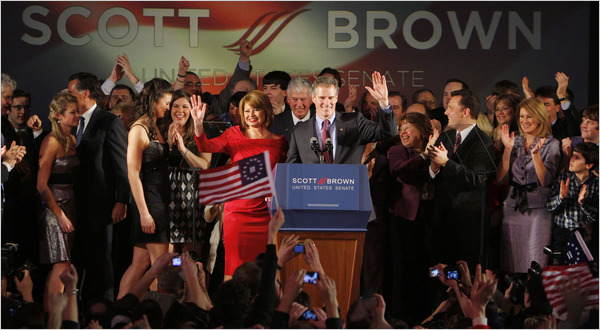While President Obama’s use of the social web to connect with voters and raise funds has been well-documented, it may be Scott Brown’s impossible 2010 senatorial win that cements the social web’s role in politics — and perhaps sets it at the forefront of social web innovation.
To set the stage, this was one of the most important state elections in American history. Healthcare reform was the centerpiece of the Democratic platform and its success hinged on the simple fact that the party held 60 seats in the U.S. Senate, the majority needed to overcome procedural tactics from the opposition that could prevent a vote. That tenuous balance of power shifted when Democratic Senator Ted Kennedy of Massachusetts died of cancer last August. The future of healthcare reform and the political makeup of the Senate apparently would be determined by a special election in that state.
This Massachusetts senatorial seat has had a Democratic incumbent for 57 consecutive years and Martha Coakley, the state’s well-funded attorney general, was considered a prohibitive favorite to continue that trend. Yet the victory went to Brown, a little-known Republican state senator, who surged in the final two weeks of the campaign and overcame a 30-point deficit in just over two months.
What could have caused this amazing turn of events? While his election was certainly aided by growing concern over Democratic policies, tireless campaigning, and some timely Republican funding, his use of the social web, as documented by a new study, may be the tactic that will imprint state and local elections forever.
According to research conducted by the Emerging Media Research Council, Brown’s effective use of social networking tools including Facebook, Twitter, and YouTube. could have been a factor in his surge. Here were his numbers as of election day:
Facebook Fans: Brown (70,800), Coakley (13,529) He received 10 times more Facebook interactions than his opponent.
Twitter Followers: Brown (9,679), Coakley (3,385) Brown’s Twitter feed dominated his web page. Both candidates tweeted about the same amount, but Brown offered twice as much original content, providing a more “engaged response.”
Ning: The “Brown Brigade” had 6,000 members. The platform created a campaign community to announce events, organize outreach, and compile blogs about his campaign.
Blogging: Did not appear to be a factor. Brown did not have one. Coakley’s discussed campaign events and received few comments.
YouTube Video Views: Brown (578,271), Coakley (51,173)
While visits to both candidate webpages were about equal, the study concludes that Brown’s use of social media helped drive his election in several ways, including boosting name recognition both in Massachusetts, and out (which helped fundraising). They note that just 51% of Massachusetts voters had heard of Brown in a Nov. 12 poll, and by Jan. 14 his name recognition was at 95%.
An irony of this development is that Democrats have received the bulk of the credit for progressing campaign-oriented social media networks, but were out-done by the Republicans. In fact, a report released this year found that Republican lawmakers were using Twitter more than five times as much as Democrats. Leading tweeters are Sen. John McCain and South Carolina Senatoe Jim DeMint, who was determined by one algorithm to have more Twitter “clout and influence” than any other senator.
Clearly, the use of social media will now be inexorably linked to political campaigning. But the more interesting prospect may be what is yet to come. With the intense research, resources and scrutiny given to the use of the social web as a tool of stakeholder engagement, could political parties emerge as principle technology innovators?
Politics as social web innovator and driver brings up some other interesting questions:
- How do social web lessons from the business world translate into the world of politics?
- How will social media policies apply to political campaigns … to prevent potential embarassment from over-zealous tweeters, for example?
- How will these lessons translate in other countries, especially where social media adoption is just beginning?
- Why weren’t blogs more important as a mechanism for political response and establishing a voice of authority? Are they afraid of putting their stands in writing?
- What business opportunities will emerge from this insatiable need for political social media consulting?



